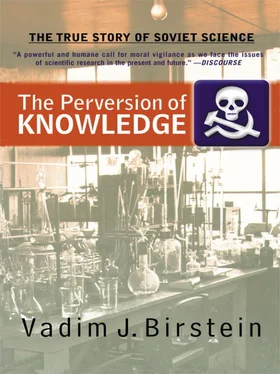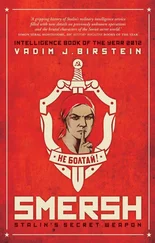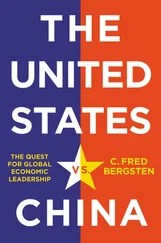After a yearlong “investigation,” on April 8, 1948, Academician Parin was convicted by the OSO as “a traitor of the Motherland” (Article 58-1a) and sentenced to twenty-five years’ imprisonment. 392At first he was sent to the city of Norilsk, at the time a center of labor camps famous for their terrible conditions. Fortunately, he was recalled on the way to Norilsk and incarcerated in Vladimir Prison, where he was kept as an “American spy.” For part of his term here, Parin shared Cell No. 13 with professor of history Lev Rakov and the writer Daniil Andreev. 393Together, these cell mates managed to secretly write a book, The Newest Plutarch , which was eventually published in 1991. 394Parin wrote forty-four stories for the book.
Parin was released after Stalin’s death, in November 1953. He successfully continued his scientific and administrative career. In 1960, he became director of the Institute of Normal and Pathologic Physiology of the Medical Academy, and from 1965 to 1969, he was director of the newly organized Institute of Medical-Biological Problems. In 1966, he was elected to the USSR Academy of Sciences, and from 1967 until his death in 1971, Academician Parin was vice president of the Medical Academy. As for Professor Roskin, in 1956 he received a personal letter from the new leader of the state and the Communist Party, Nikita Khrushchev. 395In this letter Khrushchev apologized for the persecution of Roskin and Klyueva (surely a unique gesture from a Communist Party leader to a nonmember of the Party). After this, Roskin was able to continue his work at Moscow University.
I remember the two main figures of the “ cruzin affair,” Professor Roskin and Academician Parin. As a student, I met Professor Roskin from time to time at the Biology Faculty of Moscow University. With a mustache, smartly dressed, he looked like a typical representative of the old Russian prerevolutionary intelligentsia. Sometimes I saw him talking to my father; they had a lot in common, especially their passion for invertebrate zoology. During those days I knew about the history of cruzin in general, but I became aware of the details much later, after Professor Roskin and my father had already died and, unfortunately, I had no opportunity to question them.
For a couple of years, in the early 1960s, Dr. Parin’s youngest son, Aleksei, was my close friend, and I frequently visited his huge apartment full of books in a building not far from downtown Moscow. Several times I met Aleksei’s father, an extremely polite and educated person with a kind facial expression, who never showed that he held a high-level official position in the Soviet scientific hierarchy. Of course, I knew that he had been arrested during the Stalin years. Also I knew that because of his arrest, Aleksei’s eldest brother, Vasilii, was expelled from the Medical Institute and was forced to work as a mover for a while (later he became a famous Moscow surgeon). And I knew that the whole family (Aleksei’s other brother, his sister, and especially his mother) had a very difficult time before Stalin died. But I did not know the details of the story described above. During those days, it was not polite to talk about somebody’s arrest and imprisonment.
One person, Iosif Rapoport (1911–1990), spoiled the triumph of Lysenko at the August 1948 Session of VASKhNIL. This short, thin geneticist with an eye patch over his left eye dared to interrupt Lysenko and his cronies with sharp comments. The stenographers were so frightened that only twenty years later one of them told Rapoport: “We stenographers decided not to put your sharpest phrases in writing.” 396However, they did include the bit where Rapoport screamed “Obscurantists!” in the middle of Lysenkoist Nikolai Turbin’s speech. 397
Real geneticists were not invited to the session, and it was clear that the organizers of the session would do everything in their power to pretend that every biologist had finally accepted Lysenko’s ideas. “Most people of the audience,” Rapoport wrote later, “were those whom Lysenko promised to put quickly in high positions, making them ‘Generals’ and ‘Admirals’ (his own words).” 398Rapoport, who received his ticket from an acquaintance, gave the only speech in opposition to the Lysenkoists. The journalist Mark Popovsky recalled later:
…I can still see the figure of Iosif Rapoport, with his black curls and boyish expression. He looked very handsome in his military tunic without shoulder boards but with rows of medal ribbons on his chest. Even the black bandage over an empty eye socket did not disfigure him, but lent a keener expression to his pale nervous face. His address, too—he was a candidate of science at the time—was nervous but firm in tone. He confined himself in the main to purely scientific points: that genes were a physical reality, that mutations could be controlled, that genetics had been of great benefit to mankind and could produce many more useful results. He ended with the blameless statement that “only on the basis of honesty and criticism of our own mistakes can we advance toward the great success to which our country calls us.” 399
After five minutes, Rapoport was interrupted by Pavel Lobanov, chairman of the session, deputy minister of agriculture, and newly appointed VASKhNIL academician. Later, in April 1956, Lobanov replaced Lysenko as VASKhNIL president. 400As Popovsky recalled, after Rapoport’s speech, “the applause was mingled with hostile whistling.” 401The speech was published in Pravda with unauthorized changes. 402Rapoport’s letter to the newspaper requesting it to publish his authorized changes was not answered. When Rapoport called the chief editor (and Central Committee member) Pyotr Pospelov, the editor answered: “ Pravda never makes a mistake.” 403
The punishment was immediate. In September 1948, Rapoport was fired from the Academy Institute of Cytology, Histology, and Embryology (Koltsov’s former institute). On January 5, 1949, the Party organization of this institute expelled him from the Communist Party. 404According to Party rules, the decision was approved by the bureau of the regional Party organization. This meeting, as described by a participant, was quite unusual and colorful:
At the meeting of the Regional Party Bureau Comrade Mityaev gave a political evaluation of Comrade Rapoport’s behavior. In particular, he pointed to his [Rapoport’s] demagogic anti-Party statements that the formal geneticists had supposedly been punished. In this way he [Rapoport] agreed with the bourgeois scientists of Britain and the United States. During [Mityaev’s] speech Rapoport screamed and banged on the table and tried to confront the speaker. Therefore, at the Bureau meeting, as at the Party meeting at the Institute, Rapoport did not even try to accept his errors. On the contrary, out of bravado he claimed that he had his own point of view and was not afraid to defend it. But this point of view did not correspond to our Party line… 405
All copies of the institute’s journal with his last papers on the action of chemical mutagens were taken out of circulation and destroyed. 406Rapoport found work as a geology technician, in which capacity he worked for years. He returned to genetics only in 1958. 407
Rapoport started his scientific career as a postgraduate student of Professor Koltsov. However, World War II interrupted his research. In 1941, he volunteered for the Moscow People’s Militia and spent five years of the war at different fronts. The People’s Militia troops were formed in 1941 mainly in Moscow and Leningrad when the German Nazis were at the outskirts of these cities. These troops consisted of volunteers who were too old or were unqualified for the draft. Because of the disastrous situation at the fronts in autumn 1941, these troops were sent into battle with very little military training or equipment. Very few survived the first days of battle.
Читать дальше











